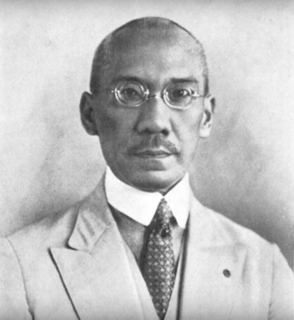
Wage Rudolf Soepratman was an Indonesian songwriter who wrote both the lyrics and melody of the national anthem of Indonesia – "Indonesia Raya". He is an Indonesian National Hero.

Education in Indonesia falls under the responsibility of the Ministry of Education, Culture, Research, and Technology and the Ministry of Religious Affairs. In Indonesia, all citizens must undertake twelve years of compulsory education which consists of six years at elementary level and three each at middle and high school levels. Islamic, Christian, Catholic, and Buddhist Schools are under the responsibility of the Ministry of Religious Affairs.

Sutan Sjahrir was an Indonesian politician, and revolutionary independence leader, who served as the first Prime Minister of Indonesia, from 1945 until 1947. Previously, he was a key Indonesian nationalist organizer in the 1930s and 1940s. Unlike some of his colleagues, he did not support the Japanese during the Japanese occupation and fought in the resistance against them. He was considered to be an idealist and an intellectual.

Dr. Gerungan Saul Samuel Jacob Ratulangi was a Minahasan teacher, journalist, politician, and national hero from North Sulawesi, Indonesia. He was part of the committee that ratified the Constitution of Indonesia and served as the first Governor of Sulawesi.

Djamaluddin Adinegoro was an Indonesian press pioneer. He is known as a reporter, writer, and political analyst. Through his writing in various newspapers, Adinegoro has made a great contribution in developing journalism and the Indonesian language. His name was immortalized as a journalism award in Indonesia: the Adinegoro Award. Djamaluddin was a younger half-brother of Muhammad Yamin.

Soenario Sastrowardoyo, more commonly known simply as Soenario, was an Indonesian politician, and diplomat, who served as the 7th Foreign Minister of Indonesia, from 1953 until 1955, during the First Ali Sastroamidjojo cabinet, under Prime Minister Ali Sastroamidjojo. He was one of Indonesia's leading figures during the Indonesian independence movement and served as an administrator for the Perhimpoenan Indonesia association in the Netherlands.

HajiAgus Salim was an Indonesian journalist, diplomat, and statesman. He served as Indonesia's Minister of Foreign Affairs between 1947 and 1949.

Teuku Mohammad Hasan was an Indonesian politician and national hero from Aceh, who served as the first and only governor of Sumatra from 1945 until 1948. He also served as a cabinet minister in Sjafruddin Prawiranegara's emergency cabinet and was a member of both the Senate of the United States of Indonesia (USI) and the Provisional People's Representative Council (DPRS) of the Republic of Indonesia.

Besar Mertokusumo was an Indonesian advocate, said by Daniel S. Lev to be the first.

Kan Hok Hoei Sia, generally known as Hok Hoei Kan or in short H. H. Kan, was a prominent public figure, statesman and patrician landowner of Peranakan Chinese descent in the Dutch East Indies.

Hamid Algadri or Hamid Al-Gadri was a pioneer of freedom for Indonesian independence who was meritorious in Linggadjati Agreement, Renville Agreement, Dutch–Indonesian Round Table Conference and one of the members of parliament in the founding days of the Republic of Indonesia.
Phoa Liong Gie Sia was an Indonesian-born Swiss jurist, politician and newspaper owner of the late colonial era in the Dutch East Indies.

Arnoldus Isaac Zacharias Mononutu was an Indonesian nationalist, politician, and national hero of Indonesia from North Sulawesi, who served as Minister of Information from 1949 until 1950, and the again from 1951 until 1953. He later became the first Indonesia Ambassador to China, as well as the third Rector of Hasanuddin University. A member of the Indonesian National Party, Mononutu was also involved in the struggle for Indonesia's independence. Having gained his sense of nationalism during his post-secondary studies in the Netherlands. In 2020, he was posthumously given the honorary title of National Hero of Indonesia.
Khouw Khe Hien (1907–1938) was a Chinese-Indonesian aviation pioneer, businessman and millionaire heir. He is best remembered today for commissioning Walraven 2, the first aeroplane manufactured in the Dutch East Indies, now Indonesia.
Han Tiauw Tjong Sia (1894–1940), known as Dr. Ir. Han Tiauw Tjong, was a prominent colonial Indonesian politician, engineer, community leader and a member of the influential Han family of Lasem. He sat in the Volksraad of the Dutch East Indies for two terms, and was a founding member of the centre-right political party Chung Hwa Hui. Han also served as a Trustee of the Technische Hoogeschool te Bandoeng from 1924 until 1940.

Mr. Sutan Mohammad Amin Nasution, also known by his birth name Krueng Raba Nasution was an Acehnese–Mandailing lawyer and politician.

Abdul Hakim Harahap was an Indonesian politician who held various positions, including deputy prime minister, in the 1950s.

Tio Tek Hong (1877–1965) was a colonial Indonesian businessman and record executive, best-remembered as a pioneer of the Indonesian music recordings industry and as the founder of Toko Tio Tek Hong, one of the country's earliest modern department stores. He was also the first person to make a recording, in 1929, of Indonesia's future national anthem, Indonesia Raya.

Air Chief Marshal (Ret.) Soerjadi Soerjadarma was the Chief of Staff of the Indonesian Air Force from 1946 to 1962.

Rear Admiral Mohammad NazirIsa was an Indonesian military officer, minister, and diplomat. He served as Chief of Staff of the Indonesian Navy from 1946 to 1948, Minister of Shipping from 1957 to 1959, and Indonesian Ambassador to Switzerland and the Vatican.

















